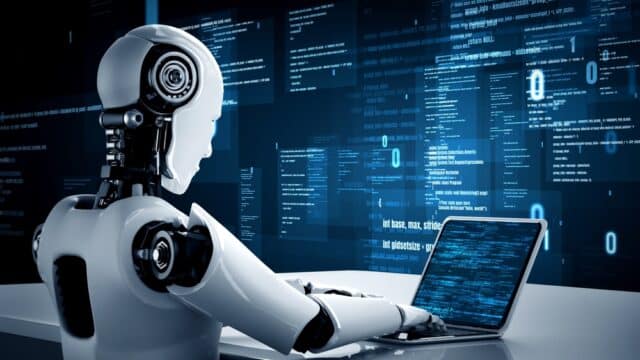How will AI change the future of software development teams?

AI is revolutionizing the landscape of software development, but it isn’t about replacing human developers. Instead, we are entering an era of “AI-augmented development,” where AI tools are becoming invaluable allies, enhancing human abilities across the software lifecycle. AI will help close the gap between the high demand for custom software and the limited engineering capacity worldwide.
In this new paradigm, AI is stepping in to assist with repetitive and time-consuming tasks, allowing developers to focus on more complex problems. The evolution of software teams will include a new breed of AI-native developers specializing in integrating AI into applications and leveraging AI tools. With AI, the potential productivity boost for developers is extraordinary, allowing them to work faster and smarter. However, while AI can amplify a developer's capabilities, it cannot replace the human creativity, problem-solving, and decision-making that are essential to successful software development. The future belongs to teams that can skillfully blend AI with human expertise.
The role of AI in bridging the software supply-demand gap
AI is crucial in addressing the gap between the growing demand for software and the limited supply of engineering talent -- one of the software industry’s longest-standing challenges. For decades, software development has been supply-constrained, with more businesses seeking custom software solutions than the available engineering capacity can handle. AI will help close that gap by creating new leverage for software engineers across the globe.
By automating repetitive tasks and speeding up coding, AI tools free developers to focus on higher-order thinking, system design, and problem-solving. This increased efficiency allows development teams to complete projects faster and more accurately, reducing bottlenecks in the production process. AI’s ability to assist in writing code, identifying bugs, and even suggesting new functionality enables developers to take on more projects without compromising quality.
Additionally, AI-enhanced development helps expand the capacity for custom software, allowing companies to meet specific business needs more rapidly. As AI creates new opportunities for scaling development efforts and delivering tailored software solutions faster than ever, the gap between supply and demand is narrowing.
Evolution of software development roles
The integration of AI into software development is leading to significant shifts in team roles and responsibilities, creating new positions while reshaping existing ones. One of the most notable changes is the emergence of AI-native developers who excel at utilizing AI-powered coding assistants, prompt engineering, and integrating AI features into software applications. AI-native developers will become a new breed of engineering, skilled in leveraging AI tools to build faster and smarter solutions.
For experienced developers, AI acts as an amplifier, boosting productivity to levels previously unattainable. The “10x” developer, known for their exceptional output, could transform into a “100x” developer by mastering AI-assisted development. With AI handling routine tasks, senior developers can focus on strategic and complex coding challenges, maximizing their value to the team.
However, the rise of AI is also shifting the landscape for junior developers. Tasks traditionally handled by entry-level engineers, such as debugging and simple code generation, are increasingly automated by AI copilots. As a result, demand for junior roles may diminish.
Conversely, prompt engineers are becoming essential members of development teams. These specialists craft precise prompts and debug AI outputs, working alongside traditional developers to harness AI’s full potential.
Overall, AI is redefining the roles within software teams, enabling some positions to evolve and new ones to emerge, pushing the boundaries of what software development can achieve.
Shifting QA and testing responsibilities
AI is also reshaping the landscape of quality assurance (QA) and testing in software development. As AI takes over many repetitive and routine testing tasks, QA professionals find their roles shifting rather than disappearing. AI-assisted testing is becoming the norm, with machines handling tasks like regression testing, bug detection, and performance monitoring more efficiently and accurately than humans can.
Despite this automation, QA remains essential for areas that require human insight, creativity, and adaptability. For instance, testing new features and ensuring that software aligns with user expectations and business goals still demands a hands-on approach.
While testing stable functionality can be automated, QA's value lies in adapting to new features and stepping outside the box to find failure modes. Additionally, the emergence of test architects is reshaping how teams approach software testing. These professionals design and oversee complex AI-driven testing frameworks, ensuring that AI-generated code is thoroughly vetted and free of issues. By integrating AI with human expertise, QA teams are becoming more strategic and focused on ensuring that software performs reliably in real-world scenarios while keeping pace with development speed.
AI-driven team dynamics and collaboration
The integration of AI into software development is fostering deeper collaboration and transforming team dynamics. AI tools are not only changing how code is written but also how team members interact and collaborate across different disciplines. Teams now include more specialized roles, such as AI-native developers, prompt engineers, and test architects, who work closely with traditional developers to optimize the software development process.
AI-driven teams rely on tighter collaboration between software developers, data scientists, business analysts, and designers. For instance, while AI enhances the role of business analysts by helping generate user stories and requirements, human insight is still needed to align AI-generated ideas with business goals and ensure that the software solves real-world problems. Similarly, interaction designers frequently work with AI to craft better user experiences, using AI-driven insights to continuously test and refine designs.
The new team dynamics also encourage cross-disciplinary collaboration. Developers must now work alongside AI specialists to build intelligent systems, while business analysts and UX designers ensure that the solutions meet both technical and user-centric needs. This increased collaboration results in more agile and effective teams capable of delivering complex projects more quickly and efficiently. AI is, essentially, becoming the connective tissue that binds these diverse team members together, enabling faster decision-making and greater innovation across the entire software development process.
Challenges and opportunities of AI in software development
While AI brings tremendous opportunities to software development, it also presents challenges that teams must address. One of the primary challenges is managing AI's limitations.
Although AI can automate routine tasks and enhance productivity, it cannot fully replace human intuition, creativity, or complex problem-solving. Developers must recognize that AI tools are not infallible and may generate inaccurate code or fail to understand nuanced requirements. Human oversight ensures that AI-driven development aligns with business needs and user expectations.
Another challenge lies in maintaining transparency and ethical use of AI. The growing complexity of AI models requires developers to prioritize explainable AI (XAI), which ensures that AI systems are understandable and accountable. This is particularly important in high-stakes industries like healthcare and finance, where errors can have significant consequences.
However, these challenges are balanced by numerous opportunities. AI allows teams to scale faster, innovate more effectively, and tackle increasingly complex projects. It can also help democratize software development by making tools and frameworks more accessible to a broader range of developers.
AI is undeniably changing the future of software development, offering new possibilities while reshaping team roles and responsibilities. Success will come to teams that embrace AI’s potential while maintaining the human touch needed to drive creativity, ethical decision-making, and complex problem-solving.
Image credit: BiancoBlue/depositphotos.com

Dev Nag is CEO of QueryPal.
